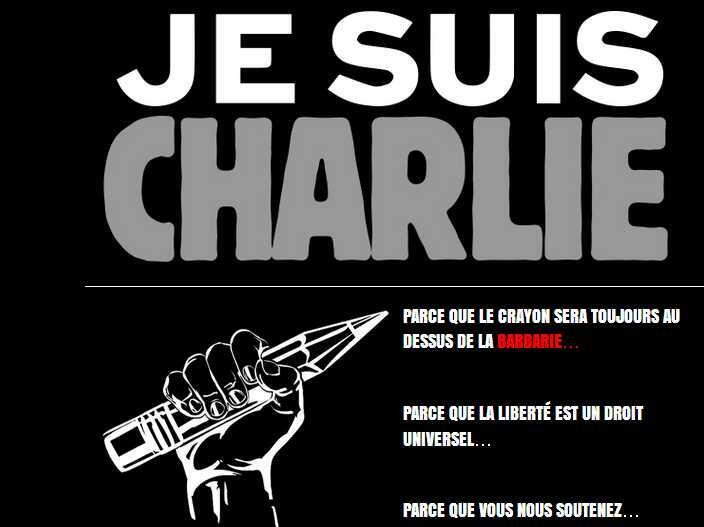French weekly magazines review 11 January 2015
This week's top story was still moving and unresolved when the French weeklies published but there is less coverage of the Charlie Hebdo affair than one might have expected in them. I suspect that the magazines are put to bed early - that's the journalists' phrase for completing the contents and sending pages for printing.
Issued on:

Le Point touches on it tangentially - with a cover story and 12 inside pages on what it calls "The true life of Mohammed". It promises readers "Love, war, women, the discoveries of historians, little-known facts and received ideas." More on that later.

I cannot find a word about Charlie Hebdo or the killings in le Monde magazine. However, its cover is jet black - without text, pictures or illustrations. Black is the colour of mourning. Which is a likely explanation. Too late to change the contents. Not too late, perhaps, to express grief and pay silent tribute to the victims.
The only magazine to take the bull by the horns is left-leaning Marianne. And, if you'll forgive the mixed metaphor, Marianne pulls no punches. On its cover is a cartoon of a giant arm and hand, seemingly extending down from the heavens. Its index finger is pressing on the head of a small, disconsolate, bearded figure wearing the white skullcap of a Haji and holding what looks like a studded club.
"Allah is big enough to defend Mohammed all alone . . . understand?" says the voice from on high. The cover headline is "Continue the fight!"
Inside are 12 pages devoted to Charlie Hebdo, last week's killings, the context, the issues, the debates - along with three dozen cartoons, including more than a few from the satirical weekly that are guaranteed to offend somebody somewhere. The illustrations show that Charlie was an equal opportunity gadfly. Christians, Muslims, Jews, Buddhists, Hindus, Sikhs, French politicians, world leaders. In their view, anyone with power is fair game. Nobody is off-limits from its savage, insolent humour. To say nothing is sacred is an understatement.
The paper quotes Charlie Hebdo's editor, Stéphane Charbonnier, known as Charb, who was the first to be killed by the Islamist gunmen on Wednesday. "If we start to say 'we can't draw Mohammed' next we mustn't draw Muslims . . . it's the end of freedom of expression." I'm not entirely convinced by that argument but that's what he believed.
Marianne asks "Why were they so alone?" - they being those who worked for Charlie Hebdo. "What killed our friends," it wonders. "The hatred of their killers, for sure. But not that alone. They were killed also by their isolation," the paper says. "Every week, on the front line in defence of freedom of expression, they were increasingly alone. They took on what others were doing less and less. They battled with little support against a growing threat, progressive and predictable, which courage alone was not enough to thwart."
There is much, much more. "Fight evil at the roots;" "Cry for our dead, and grit your teeth." "Don't legislate in haste." And, "We're screwed but the fight continues." Noble thoughts. Yet no one, certainly not Marianne, has waved a magic wand to fix what's broken.
Right-wing le Point is altogether more sober. Its "Real life of Mohammed" story draws on the work of historians who have studied stone engravings found in southern Arabia, along with texts in Greek, Syriac and Hebrew.
The scholarly report is illustrated with vivid 15th- and 16th-century Persian and south Asian miniatures. In some the prophet is veiled. In others, his face is visible. It's proof that the row over whether or not he can be pictured is not a new one. In view of the fact that, today, Islam has around one billion followers worldwide and that the ancient ideal of a Muslim caliphate has been revived by some believers, it is a worthwhile enquiry.

The cover of the Nouvel Observateur features the best-selling French novelist Michel Houellebecq, who declares that he has "survived all attacks". Houellebecq is no stranger to controversy. More than a decade ago he was taken to court for allegedly inciting racial hatred. In the event, he was found not guilty. His latest offering, a novel entitled Soumission (Submission) that was published last week, is his preferred mix of extravagant fantasy and polemic. The story, set in 2022, unfolds in a France that has been Islamised.
The Obs describes the book as "sulphurous" - which is to say caustic, virulent, vitriolic. In short, rather unpleasant. Houellebecq tells the Obs his book is political fiction. 2022 is too soon, he explains. He has accelerated the time frame. Nonetheless, he believes the French republic is dead.
The magazine invites comments from a psychoanalyst, who sees in the book "the harbinger of troubles in Europe for which Muslims will once again be the scapegoats". Naturally, the bloodletting in France last week has overshadowed the fuss over Soumission. But it confirms that - love him or loathe him - Houellebecq's work does hold up a mirror to French society, albeit a distorting, fairground mirror.
L'Express, meanwhile, attempts to cheer us up with an "exclusive" cover story about "How to find happiness". Certainly, France needs to be dragged out of the slough of despond. The magazine informs us that books and methods abound … charlatans, too. A less than cheerful thought.
Daily newsletterReceive essential international news every morning
Subscribe